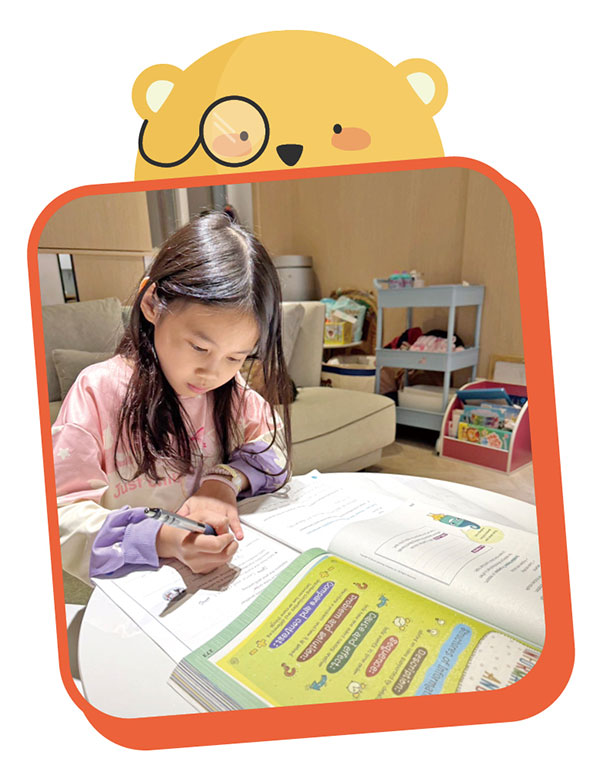

~ Zachary Warmke
Curriculum Coordinator
The curriculum at KCIS is packed with activities. Our students write great projects, read dozens of books, learn hundreds of vocab words, and more. At times, it can seem overwhelming. In this article, we will discuss ways to plan balanced study habits. We hope parents and children will talk about this subject together so every student can succeed.
Homework and Week Numbers
The International Department assigns one item of homework per day to each student. Our philosophy is that homework should reflect their experience in the classroom. It should remind students about the vocab or grammar they learned in class, help them understand the texts they read in class, and so on. We don’t want to overwhelm children with homework. Our assignments should take less than one hour to finish. With that in mind, let’s talk about our overall organization.

At KCIS, our teachers and students think in “weeks”. Students become familiar with terms like “Week 14 Vocab List”. We organize our curriculum into these “weeks” to make everything easier to manage. Students know that they have a new vocab list at the beginning of each week, and a larger homework assignment at the end.
This pattern can help families plan their homework and study habits. Parents know their child will have vocab homework on Monday or Tuesday. This homework will refresh the student’s memory of the words they just learned, and to practice using them. Parents can help by encouraging their child to make flash cards or use a website like Wordwall to help them memorize the words.
At the end of the week, teachers give students a more complex homework assignment. This is usually a section of the workbook (or, in some classes, an online Google Form). Students will need to use skills and concepts they learned in class discussions. As long as they participated in the classroom, this homework should be easy to understand.
Hooked on Books and Healthy Reading Habits
The major goal of Hooked on Books is to get students to read independently. We encourage them to do this through AR point goals and Lexile level increases, but these numbers are less important than developing students’ reading habits. Research suggests that just 20 minutes of independent reading per day can greatly increase a child’s reading comprehension, vocabulary, and more. That’s why foreign English teachers reserve 20 minutes of their class for quiet reading.

We also encourage students and families to schedule reading time at home. Although students can only take AR quizzes in their foreign English teacher’s class, they can read anywhere and any time. Having 10-30 minutes of quiet reading time at home, perhaps before bedtime, can help students. Parents can also help by simply talking about books with their child. Sharing and discussing books with others can be a great motivator for students to read more and to think about what they read.
Getting Help
If any part of our curriculum seems complicated or confusing, parents can always reach out to their child’s teachers on the E-Communication Book. Students can also visit their teacher during break time if they have questions. Our department’s goal is to teach English in a positive and supportive way. We hope our systems promote a happy and successful learning community.

From the Editor
From Habits to Excellence
國際處主任 賴國宜
Before reading it, take a moment to reflect: Do you know which day your child has vocabulary tests? When is their grammar test? What is their English homework, and when is it due? Our English program follows a weekly structure, beginning with vocabulary, moving to reading, grammar, project, and Achieve Writing topics, and ending with homework. Weekly tests and homework are integral to reinforcing classroom learning. However, success goes beyond classroom participation - it requires daily practice and review. We would like to encourage you to explore Mr. Warmke's article to better understand how our curriculum is planned and discover ways to support your child in cultivating effective study habits. With consistent effort, studying becomes a routine, and progress follows naturally.
在閱讀本文之前,讓我們先來做個簡短的小問卷,您知道孩子每週哪一天有單字測驗嗎?哪一天進行文法小考?每週有哪些作業?何時要繳交?為了幫助孩子建立穩定的學習步調,我們的英文課程採取以「週」為單位的規劃方式,每週從單字教學展開,接著介紹閱讀或文法主題,最後延伸至專題探究或寫作工作坊。配合著這樣的節奏,每週會有固定的單字、文法或閱讀的作業或小考,幫助孩子穩定提升學習成效。然而,學習不僅僅是課堂的聆聽和參與,每日完成作業和按時複習也是提升學習效率的關鍵。誠摯推薦您閱讀課研組長Mr.Warmke的專文,深入了解我們如何規劃英文課程的進度與內容,並協助孩子在家建立自主規劃課業與複習的能力,透過養成每天按時完成作業和複習的習慣,逐漸把「認真學習」內化為理所應當的生活態度,當學習成為習慣,他們的學習表現自然會有顯著的進步。
盤古開天、后羿射日、嫦娥奔月等神話是大家耳熟能詳的經典故事,而西洋文學中,也有很多類似的神話傳說,這些奇幻故事不僅展現古人的生活智慧,還激發孩子的好奇心與創造力。四年級的孩子們以自身對周圍環境和大自然的觀察為起點,創作出屬於他們的神話故事,歡迎閱讀,欣賞孩子們的奇思妙想。